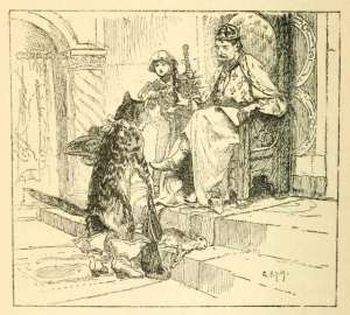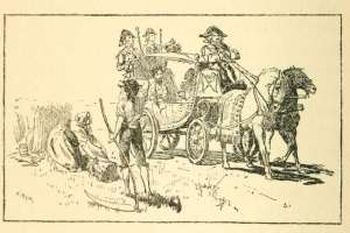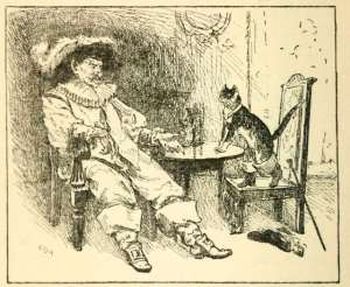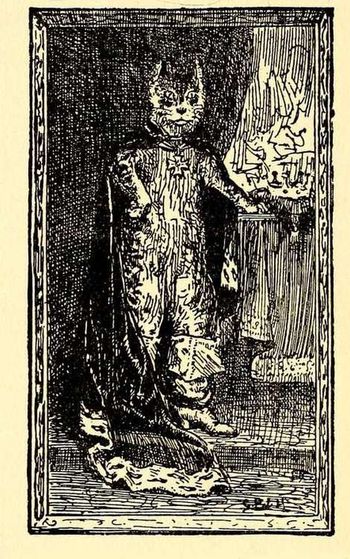The Master Cat; Or, Puss in Boots

(MP3-08'52'')
There was a miller who left no more estate to the three sons he had than his mill, his ass, and his cat. The partition was soon made. Neither scrivener nor attorney was sent for. They would soon have eaten up all the poor patrimony. The eldest had the mill, the second the ass, and the youngest nothing but the cat. The poor young fellow was quite comfortless at having so poor a lot.
My brothers," said he, "may get their living handsomely enough by joining their stocks together; but for my part, when I have eaten up my cat, and made me a muff of his skin, I must die of hunger."
The Cat, who heard all this, but made as if he did not, said to him with a grave and serious air:
"Do not thus afflict yourself, my good master. You have nothing else to do but to give me a bag and get a pair of boots made for me that I may scamper through the dirt and the brambles, and you shall see that you have not so bad a portion in me as you imagine."
The Cat's master did not build very much upon what he said. He had often seen him play a great many cunning tricks to catch rats and mice, as when he used to hang by the heels, or hide himself in the meal, and make as if he were dead; so that he did not altogether despair of his affording him some help in his miserable condition. When the Cat had what he asked for he booted himself very gallantly, and putting his bag about his neck, he held the strings of it in his two forepaws and went into a warren where was great abundance of rabbits. He put bran and sow-thistle into his bag, and stretching out at length, as if he had been dead, he waited for some young rabbits, not yet acquainted with the deceits of the world, to come and rummage his bag for what he had put into it.
Scarce was he lain down but he had what he wanted. A rash and foolish young rabbit jumped into his bag, and Monsieur Puss, immediately drawing close the strings, took and killed him without pity. Proud of his prey, he went with it to the palace and asked to speak with his majesty. He was shown upstairs into the King's apartment, and, making a low reverence, said to him:
"I have brought you, sir, a rabbit of the warren, which my noble lord the Marquis of Carabas" (for that was the title which puss was pleased to give his master) "has commanded me to present to your majesty from him."

"Tell thy master," said the king, "that I thank him and that he does me a great deal of pleasure."
Another time he went and hid himself among some standing corn, holding still his bag open, and when a brace of partridges ran into it he drew the strings and so caught them both. He went and made a present of these to the king, as he had done before of the rabbit which he took in the warren. The king, in like manner, received the partridges with great pleasure, and ordered him some money for drink.
The Cat continued for two or three months thus to carry his Majesty, from time to time, game of his master's taking. One day in particular, when he knew for certain that he was to take the air along the river-side, with his daughter, the most beautiful princess in the world, he said to his master:
"If you will follow my advice your fortune is made. You have nothing else to do but go and wash yourself in the river, in that part I shall show you, and leave the rest to me."
The Marquis of Carabas did what the Cat advised him to, without knowing why or wherefore. While he was washing the King passed by, and the Cat began to cry out:
"Help! help! My Lord Marquis of Carabas is going to be drowned."
At this noise the King put his head out of the coach-window, and, finding it was the Cat who had so often brought him such good game, he commanded his guards to run immediately to the assistance of his Lordship the Marquis of Carabas. While they were drawing the poor Marquis out of the river, the Cat came up to the coach and told the King that, while his master was washing, there came by some rogues, who went off with his clothes, though he had cried out: "Thieves! thieves!" several times, as loud as he could.
This cunning Cat had hidden them under a great stone. The King immediately commanded the officers of his wardrobe to run and fetch one of his best suits for the Lord Marquis of Carabas.
The King caressed him after a very extraordinary manner, and as the fine clothes he had given him extremely set off his good mien (for he was well made and very handsome in his person), the King's daughter took a secret inclination to him, and the Marquis of Carabas had no sooner cast two or three respectful and somewhat tender glances but she fell in love with him to distraction. The King would needs have him come into the coach and take part of the airing. The Cat, quite overjoyed to see his project begin to succeed, marched on before, and, meeting with some countrymen, who were mowing a meadow, he said to them:
"Good people, you who are mowing, if you do not tell the King that the meadow you mow belongs to my Lord Marquis of Carabas, you shall be chopped as small as herbs for the pot."
The King did not fail asking of the mowers to whom the meadow they were mowing belonged.
"To my Lord Marquis of Carabas," answered they altogether, for the Cat's threats had made them terribly afraid.

"You see, sir," said the Marquis, "this is a meadow which never fails to yield a plentiful harvest every year."
The Master Cat, who went still on before, met with some reapers, and said to them:
"Good people, you who are reaping, if you do not tell the King that all this corn belongs to the Marquis of Carabas, you shall be chopped as small as herbs for the pot."
The King, who passed by a moment after, would needs know to whom all that corn, which he then saw, did belong.
"To my Lord Marquis of Carabas," replied the reapers, and the King was very well pleased with it, as well as the Marquis, whom he congratulated thereupon. The Master Cat, who went always before, said the same words to all he met, and the King was astonished at the vast estates of my Lord Marquis of Carabas.
Monsieur Puss came at last to a stately castle, the master of which was an ogre, the richest had ever been known; for all the lands which the King had then gone over belonged to this castle. The Cat, who had taken care to inform himself who this ogre was and what he could do, asked to speak with him, saying he could not pass so near his castle without having the honor of paying his respects to him.
The ogre received him as civilly as an ogre could do, and made him sit down.

"I have been assured," said the Cat, "that you have the gift of being able to change yourself into all sorts of creatures you have a mind to; you can, for example, transform yourself into a lion, or elephant, and the like."
"That is true," answered the ogre very briskly; "and to convince you, you shall see me now become a lion."
Puss was so sadly terrified at the sight of a lion so near him that he immediately got into the gutter, not without abundance of trouble and danger, because of his boots, which were of no use at all to him in walking upon the tiles. A little while after, when Puss saw that the ogre had resumed his natural form, he came down, and owned he had been very much frightened.
"I have been, moreover, informed," said the Cat, "but I know not how to believe it, that you have also the power to take on you the shape of the smallest animals; for example, to change yourself into a rat or a mouse; but I must own to you I take this to be impossible."
"Impossible!" cried the ogre; "you shall see that presently."
And at the same time he changed himself into a mouse, and began to run about the floor. Puss no sooner perceived this but he fell upon him and ate him up.
Meanwhile the King, who saw, as he passed, this fine castle of the ogre's, had a mind to go into it. Puss, who heard the noise of his Majesty's coach running over the draw-bridge, ran out, and said to the King:
"Your Majesty is welcome to this castle of my Lord Marquis of Carabas."
"What! my Lord Marquis," cried the King, "and does this castle also belong to you? There can be nothing finer than this court and all the stately buildings which surround it; let us go into it, if you please."
The Marquis gave his hand to the Princess, and followed the King, who went first. They passed into a spacious hall, where they found a magnificent collation, which the ogre had prepared for his friends, who were that very day to visit him, but dared not to enter, knowing the King was there. His Majesty was perfectly charmed with the good qualities of my Lord Marquis of Carabas, as was his daughter, who had fallen violently in love with him, and, seeing the vast estate he possessed, said to him, after having drunk five or six glasses:
"It will be owing to yourself only, my Lord Marquis, if you are not my son-in-law."
The Marquis, making several low bows, accepted the honor which his Majesty conferred upon him, and forthwith, that very same day, married the Princess.
Puss became a great lord, and never ran after mice any more but only for his diversion.

Charles Perrault.
Il gatto del padrone o il gatto con gli stivali
C’era una volta un mugnaio che non aveva altro da lasciare in eredità ai tre figli se non il mulino, l’asino e il gatto. La divisione fu presto fatta. Non furono chiamati né il notaio, né l’avvocato. Essi si sarebbero mangiati quel povero patrimonio. Il maggiore ebbe il mulino, il secondo l’asino e il più giovane niente altro che il gatto. Il povero ragazzo era assai sconfortato per aver avuto così poco.
Disse: “I miei fratelli potranno vivere abbastanza agiatamente mettendo insieme i loro averi; per conto mio, quando avrò mangiato il gatto e mi sarò fatto un manicotto con la sua pelle, dovrò morire di fame.”
Il gatto, che aveva sentito tutto ciò, ma aveva fatto finta di nulla, gli disse con aria austera e seria :
”Non affliggetevi, mio buon padrone. Non dovete far altro che darmi una borsa e un paio di stivali fatti per me così che io possa correre agilmente nel fango e tra i rovi, e vedrete che non avete poi avuto una cattiva parte di eredità come immaginate.”
Il padrone del gatto non fece molto affidamento su ciò aveva detto. Spesso lo aveva visto mettere in pratica una gran quantità di furbi tranelli per acchiappare ratti e topi, come quando era solito appendersi per le zampe o nascondersi nella farina e fingere di essere morto; così non disperò del tutto che gli potesse procurare un qualche tipo di aiuto in quella miserabile condizione. Quando il gatto ebbe avuto ciò che aveva chiesto, indossò gli stivali baldanzosamente e, gettandosi il sacco in spalla, ne impugnò i lacci con le zampe anteriori e andò in una conigliera in cui c’era grande abbondanza di conigli. Mise nel sacco un po’ di crusca e di punte di cardo, si gettò lungo disteso come se fosse morto e aspettò che alcuni dei conigli più giovani, non ancora edotti degli inganni del mondo, venissero a rovistare nel sacco in cerca di ciò che vi aveva messo dentro.
Si era appena sdraiato che ebbe ciò che voleva. Un coniglietto avventato e sciocco saltò nel sacco e il signor gatto , tirando immediatamente i lacci, lo prese e lo uccise senza pietà. Orgoglioso della preda, andò a palazzo e chiese di parlare con sua maestà. Fu accompagnato al piano superiore, nell’appartamento del re, e, facendo una profonda riverenza, gli disse:
”Sire, vi ho portato un coniglio della conigliera, che il mio nobile padrone, il Marchese di Carabas, (perché questo era il titolo che al gatto era piaciuto attribuire al padrone) mi ha ordinato di offrire a vostra maestà da parte sua.”

Il re disse: “Di’ al tuo padrone che lo ringrazio e che mi ha fatto moltissimo piacere.”
Un’altra volta andò a nascondersi tra il grano, tenendo fermo il sacco aperto e, quando una coppia di pernici vi corse dentro, tirò i lacci e così catturò entrambe. Andò a farne dono al re, come aveva fatto prima con il coniglio preso dalla conigliera. Allo stesso modo il re ricevette le pernici con grande piacere e gli fece dare un po’ di denaro per una bevuta.
Il gatto continuò per due o tre mesi a portare di tanto in tanto a sua maestà selvaggina catturata dal suo padrone. Un giorno in particolare, quando sapeva con certezza che il re sarebbe andato a prendere una boccata d’aria in riva al fiume con la figlia, la più bella principessa del mondo, disse al padrone:
”Se seguirai il mio consiglio, la tua fortuna sarà assicurata. Non devi fare altro che andare a fare un bagno nel fiume, dove ti mostrerò io, e lasciare il resto a me.”
Il marchese di Carabas fece ciò che il gatto gli aveva raccomandato, senza sapere né perché né percome. Mentre stava sguazzando, passò il re e il gatto cominciò a gridare:
”Aiuto! Aiuto! Il mio padrone, il marchese di Carabas, sta per affogare.”
A questo baccano il re sporse la testa dal finestrino della carrozza e, scoprendo che si trattava del gatto che spesso gli aveva portato selvaggina così buona, ordinò alle guardie di corre subito a soccorrere sua grazia il marchese di Carabas. Mentre loro trascinavano a riva il povero marchese, il gatto andò alla carrozza e disse al re che, mentre il suo padrone stava facendo il bagno, erano giunti alcuni furfanti i quali avevano portato via i suoi vestiti, sebbene gridasse “Ladri! Ladri!” diverse volte e più forte che potesse.
L’astuto gatto li aveva nascosti sotto una grossa pietra. Il re subito ordinò agli addetti al guardaroba di correre a prendere il suo vestito migliore per il marchese di Carabas.
Il re lo vezzeggiava in modo straordinario e siccome i bei vestiti che gli aveva dato gli conferivano un magnifico aspetto (perché era ben fatto e assai bello), la figlia del re sentì per lui una certa inclinazione e appena il marchese di Carabas le ebbe lanciato due o tre rispettose eppur tenere occhiate, si innamorò di lui alla follia. Il re lo volle in carrozza perché prendesse parte alla passeggiata. Il gatto, piuttosto soddisfatto di vedere che i suoi piani stavano avendo successo, marciava davanti e, incontrando alcuni contadini, i quali stavano mietendo un campo, disse loro:
”Brava gente, voi che state mietendo, se non direte al re che i campi che state mietendo appartengono al mio signore, il marchese di Carabas, sarete fatti a pezzi piccoli come le erbette da mettere in pentola.”
Il re non mancò di chiedere ai mietitori a chi appartenesse il campo che stavano mietendo.
”Al nostro padrone, il marchese di Carabas.” risposero tutti perché il trattamento che il gatto avrebbe riservato loro li spaventava terribilmente.

Il marchese disse: “Vedete, maestà, questo è un campo che ogni anno non mancai mai di dare un raccolto abbondante.”
Il gatto del padrone, che era andato ancora avanti, incontrò alcuni mietitori e disse loro:
”Brave persone che state mietendo, se non direte al re che tutto questo granturco appartiene al marchese di Carabas, sarete fatti a pezzi piccoli come le erbette da mettere in pentola.”
Il re, che passò un momento dopo, volle sapere a chi appartenesse tutto quel granturco che vedeva.
Al nostro padrone il marchese di Carabas.” risposero i mietitori, e il re fu assai compiaciuto di ciò, quanto il marchese con il quale si congratulò. Il gatto del padrone, che andava sempre avanti, diceva le medesime parole a tutti quelli che incontrava e il re era sbalordito dalle vaste proprietà del marchese di Carabas.
Messer gatto giunse infine in un maestoso castello, il cui proprietario era un orco, il più ricco che ci fosse mai stato; tutte le terre che il re aveva attraversato, appartenevano a questo castello. Il gatto, che si era informato con cura su chi fosse questo orco e che cosa facesse, chiese di parlargli, dicendo che non sarebbe potuto passare così vicino al castello senza avere l’onore di porgergli i propri rispetti.
L’orco lo ricevette educatamente come può fare un orco e lo fece accomodare.

Il gatto disse: “Mi è stato assicurato che avete il dono di potervi trasformare in ogni genere di creatura che vi venga in mente; per esempio, vi potete trasformare in un leone o un elefante e simili.”
L’orco rispose vivacemente:”È vero e per convincerti, mi vedrai diventare un leone.”
Il gatto era tanto spaventato alla vista del leone, così vicino a sé, che si lanciò sulla grondaia, non senza difficoltà e pericolo, a causa degli stivali, perché non era abituato a camminare con essi sulle tegole. Poco dopo, quando il gatto vide che l’orco aveva ripreso il proprio aspetto naturale, scese e ammise di essersi spaventato molto.
”Inoltre sono stato informato,” disse il gatto, “ma non so se crederci, che avete anche il potere di assumere l’aspetto del più piccolo degli animali, per esempio, trasformarvi in un ratto o in un topo, ma devo confessarvi che lo ritengo impossibile.”
L’orco gridò: “Impossibile! Lo vedrai subito.”
E in quell’istante si tramutò in un topo e cominciò a correre sul pavimento. Appena il gatto se ne accorse, si gettò su di lui e lo mangiò.
Intanto il re, che passando vide il bel castello dell’orco, decise di entrarvi. Il gatto, che aveva sentito il rumore della carrozza di sua maestà sul ponte levatoio, corse fuori e disse al re:
”Vostra maestà, siate il benvenuto nel castello del marchese di Carabas.”
Il re gridò: “Ma come, marchese mio! Anche questo castello vi appartiene? Non c’è nulla di più bello di questo cortile e di tutte le imponenti costruzioni che lo circondano; entriamo, se vi aggrada.”
Il marchese diede la mano alla principessa e seguì il re, che andò per primo. Passarono in un ampio salone in cui trovarono un magnifico spuntino che l’orco aveva fatto preparare per i suoi amici, che proprio quel giorno dovevano venire a visitarlo, ma non osarono entrare, sapendo che vi era il re. Sua maestà fu assolutamente affascinato dalle buone qualità del marchese di Carabas, così come lo era sua figlia, che lo amava pazzamente e, vedendo il suo vasto possedimento, gli disse, dopo aver bevuto cinque o sei bicchieri:
”Sarà solo colpa vostra, signor mio il marchese, se non sarete mio genero.”
Il marchese, con vari e profondi inchini, accettò l’onore che sua maestà gli faceva e sposò la principessa quello stesso giorno.
Il gatto diventò un gran signore e non rincorse mai più i topi, se non per passatempo.

Charles Perrault
(traduzione dall'inglese di Annarita Verzola)